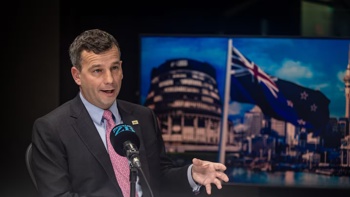Parents will soon be able to open a bank account for their child with just a birth certificate, thanks to reforms to anti-money laundering regulations.
Acting Prime Minister David Seymour announced the changes with Associate Justice Minister Nicole McKee on Monday afternoon.
New Zealand has relatively strict anti-money laundering laws, which were mostly introduced during the John Key government. They were designed to stop organised criminal and terror groups from using New Zealand to launder money. However, the rules have copped criticism for being excessively strict when it comes to fulfilling easy tasks.
McKee said that under the current rules, “a parent who wants to open an account for their eight-year-old child needs to gather and verify a long list of information, including their child’s address, date of birth, name, and their own authority to act on their child’s behalf.
“The Act also requires banks to obtain the nature and purpose of the business relationship, evaluate whether further due diligence is required, and monitoring the child’s transactions on an ongoing basis,” she said.
Under the new rules, “banks will be allowed to apply a simplified processes when risk is low”, McKee said.
“This means that if a bank puts measures in place to make a child’s bank account low-risk (e.g. by setting appropriate transaction limits) all that could be required is a birth certificate to confirm the child’s name and date of birth, and prove the relationship to the parent,” she said.
The bank can also skip questions about the “nature and purpose” of the account, and reduce or forego ongoing monitoring of a child’s banking activity, until the account’s settings are changed, for example the removal of transaction limits when a child turns 18.
The announcement was made during what is usually the Prime Minister’s post-Cabinet press conference.
Prime Minister Christopher Luxon is away and there was no Cabinet meeting on Monday as is usually the case in the second week of a Parliamentary recess, but Seymour held a press conference anyway.
Seymour will also discuss the issues of the day, as acting Prime Minister.
One of the top issues this Monday is Seymour’s own Regulatory Standards Bill, with the Finance and Expenditure Select Committee hearing the first day of oral submissions.
The submissions heard on Monday were generally negative.
Former Prime Minister Sir Geoffrey Palmer called it “the strangest piece of New Zealand legislation I have ever seen”.
Palmer said the bill, which is designed to test regulation against a set of new standards, would create “a terrific amount of extra work”.
Speaking for the Iwi Chairs Forum, Rahui Papa said the bill was a “power grab for the few, a power grab that will support the old boys’ network”.
Meanwhile, Seymour’s colleague Nicola Willis has announced changes to the Government’s FamilyBoost early childhood education policy, which is designed to improve uptake after a disappointing start.
Willis announced the maximum rebate would increase from 25% to 40% of weekly fees. The income threshold would be raised from $180,000 to $229,000.
The announcement came after issues with FamilyBoost were highlighted earlier this year, including low uptake and IRD admitting the number of families it estimated were eligible for the full weekly payment was wrong.
“We know many people are still doing it tough. These changes will help many families to deal with the increased costs that come with having young children,” Willis said.
FamilyBoost was introduced as Government policy in March 2024 and started in July that year. Families had to keep copies of their early childcare invoices to submit for a payment, which raised questions about how many eligible families would end up receiving the payment.
Willis said today IRD would investigate a direct fee-refund model.
“They will be working with early childhood services for the next little while to see whether we can have a claims system that allows fees to be directly claimed by early childhood providers so parents don’t need to do the work with IRD,” she said.
Take your Radio, Podcasts and Music with you









